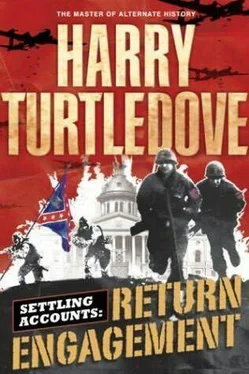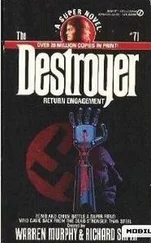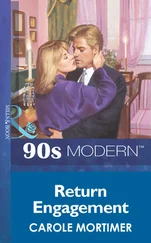Harry Turtledove - Return engagement
Здесь есть возможность читать онлайн «Harry Turtledove - Return engagement» весь текст электронной книги совершенно бесплатно (целиком полную версию без сокращений). В некоторых случаях можно слушать аудио, скачать через торрент в формате fb2 и присутствует краткое содержание. Жанр: История, на английском языке. Описание произведения, (предисловие) а так же отзывы посетителей доступны на портале библиотеки ЛибКат.
- Название:Return engagement
- Автор:
- Жанр:
- Год:неизвестен
- ISBN:нет данных
- Рейтинг книги:5 / 5. Голосов: 1
-
Избранное:Добавить в избранное
- Отзывы:
-
Ваша оценка:
- 100
- 1
- 2
- 3
- 4
- 5
Return engagement: краткое содержание, описание и аннотация
Предлагаем к чтению аннотацию, описание, краткое содержание или предисловие (зависит от того, что написал сам автор книги «Return engagement»). Если вы не нашли необходимую информацию о книге — напишите в комментариях, мы постараемся отыскать её.
Return engagement — читать онлайн бесплатно полную книгу (весь текст) целиком
Ниже представлен текст книги, разбитый по страницам. Система сохранения места последней прочитанной страницы, позволяет с удобством читать онлайн бесплатно книгу «Return engagement», без необходимости каждый раз заново искать на чём Вы остановились. Поставьте закладку, и сможете в любой момент перейти на страницу, на которой закончили чтение.
Интервал:
Закладка:
"I get a little every night, whether I need it or not." His grin came from the other side of the grave, but his voice, though weaker than before, was still the cheerful New York bray it had always been, the voice that had made people call him the Happy Warrior. Maybe he didn't want anyone else to know his job was killing him. Maybe he didn't know himself. "What have you got for me, Flora? Malcolm said you said it was important."
"It is, sir. A colored man escaped from Virginia gave me these…" She set the manila envelope on the desk between them. "I hope you have a strong stomach. This is proof the Confederates aren't just mistreating their Negroes, the way they always have. They're slaughtering them."
"Let's see." He set reading glasses on his nose, which only made him look like a learned skeleton. He went through the photos one by one, nodding every now and then. When he was through, he eyed Flora over the tops of the glasses. "All right. Here they are. What do you want me to do about it?"
"Shout it from the housetops!" she exclaimed. "When the world knows they're doing this, they'll have to stop."
"Will they?" Smith said. "Remember when the Ottomans started killing Armenians?" He waited. When Flora didn't answer, he prodded her: "Remember?"
"I remember," she said, a sudden sinking feeling at the pit of her stomach.
"We protested to the Sultan," the President said. "You'd know about that-Hosea was Vice President then, wasn't he? We protested. Even the Kaiser said something, I think. And the USA and Germany had fought on the same side as Turkey during the Great War. How much attention did anybody in Constantinople pay?"
Again, he stopped. Again, she had to answer. Miserably, she did: "Not much."
"Not any, you mean," Al Smith said. "They went on killing Armenians till there weren't a whole lot of Armenians left to kill. We're not the Confederates' allies. We're enemies. They'll say we're making it up. Britain and France will believe them, or pretend to. Japan won't care. And people here won't much care, either. Come on, Flora-who gives a damn about shvartzers?" Of course a New York Irish politician knew the Yiddish word for Negroes.
"They're slaughtering them, Mr. President," Flora said stubbornly. "People can't ignore that."
"Who says they can't?" Smith retorted. "Most people in the USA don't care what happens to Negroes in the CSA. They're just glad they don't have to worry about very many Negroes here at home. You can like that or not like it, but you can't tell me it isn't true." He waited once more. This time, Flora had nothing to say. But even saying nothing admitted Smith was right. Nodding as if she had admitted it, the President continued, "And besides, Sandusky's fallen."
"Oh… dear," Flora said, in lieu of something stronger. It wasn't that she hadn't expected the news. But it was like a blow in the belly even so.
"Yeah," Smith said, trying to seem as upbeat as he could. He put Caesar's photographs back in the envelope. "So if we start going on about this stuff right now, what will people think? They'll think we're trying to make 'em forget about what we couldn't do on the battlefield. And will they be wrong?"
"But this-this is the worst wickedness the world has ever seen!" The word was old-fashioned, but Flora couldn't find another one that fit.
"We're already in a war full of bombed cities and poison gas," Smith said. "When we're doing that to each other, who's going to get all hot and bothered about what the Confederates are doing to their own people?"
"Mr. President, this isn't war. This is murder. There's a difference," Flora insisted.
"Maybe there is. I suppose there is. If you can make people see it, more power to you," Al Smith said. "I'm very sorry-I'm more sorry than I know how to tell you-but I don't think you can."
Flora wanted to hit him, not least because she feared he was right. Instead, keeping her voice under tight control, she said, "Would you say the same thing if they were Jews and not Negroes?"
"I don't know. Maybe not. People in the USA are more likely to get hot and bothered about Jews than they are about Negroes, don't you think?" Smith sounded horribly reasonable. "If you can make it go, I'll get behind you. But I won't take the lead here. I can't."
"I'm going to try," Flora said.
X
The worst had happened. That was what everybody said. The Confederates had sliced up through Ohio and cut the United States in half. If the worst had already happened, shouldn't that have meant that men from the USA and CSA weren't killing one another quite so often now? It didn't, not so far as Dr. Leonard O'Doull could tell.
U.S. forces were trying to strike back toward the west and cut through the Confederate corridor. The Confederates, for their part, were doing their best to push eastward, toward Pennsylvania. So far, nobody seemed to be making much progress. That didn't mean an awful lot of young men on both sides weren't getting maimed, though.
O'Doull's aid station lay a few miles west of Elyria, Ohio-about halfway between lost Sandusky and Cleveland. Elyria had been the town with the largest elm in Ohio: a tree with a spread of branches of over a hundred thirty feet and a trunk almost sixty-five feet thick. It had been, but no more: Confederate artillery and bombs had reduced the tree to kindling-along with much of what had been a pleasant little place.
"Burns are the worst," O'Doull said to Granville McDougald. "Some of the poor bastards with burns, you just want to cut their throats and do them a favor."
"This tannic acid treatment we're using now helps a lot," the corpsman answered. McDougald was resolutely optimistic.
"We're saving people we wouldn't have in the last war-no doubt of that," O'Doull said. "Some of them, though… Are we doing them any favors when we keep them alive?"
"We've got to do what we can," McDougald said. "Once they get the pain under control, they thank us."
"Yeah. Once," O'Doull said tightly. He was seeing a lot more burn cases this time around than he had in the last war. Men who bailed out of barrels usually had to run a gauntlet of flame to escape. During the Great War, barrels had been latecomers and oddities. They were an ordinary part of the fighting here. With so many more of them in action, so many more horrible things could happen to their crews.
In the last war, O'Doull didn't remember anyone asking to be killed so he could escape his torment. It might well have happened, but he hadn't seen it. He did now. More than once, he'd been tempted to ignore the Hippocratic oath he'd sworn and give the victims what they wanted.
"That's why God made morphine, sir," McDougald said.
"God made morphine-and we make addicts," O'Doull replied.
"If you're in pain, that's the least of your worries," the corpsman said. "All you want to do is stop hurting. You can get over morphine addiction once you're not hurting any more. As long as the burns are giving you hell, you might as well be dead."
O'Doull thought of addiction as a personal failing, even if pain relief caused it. He eyed McDougald thoughtfully. The corpsman had a different slant on things. "You look at it from the patient's point of view, don't you? Not the doctor's, I mean."
"I'm not a doctor," McDougald said, which was formally true. He went on, "And we're here for the patients, aren't we?"
A lot of people at aid stations thought they were there to advance their own careers, or to stay out of the front-line fighting. And there were some men from churches that did not approve of members who carried guns, but that had nothing against helping the wounded. "Everybody ought to think the way you do," O'Doull said. "We'd all be better off."
The corpsman only shrugged. "Maybe yes, maybe no. My guess is, we'd just be screwed up a different way."
Читать дальшеИнтервал:
Закладка:
Похожие книги на «Return engagement»
Представляем Вашему вниманию похожие книги на «Return engagement» списком для выбора. Мы отобрали схожую по названию и смыслу литературу в надежде предоставить читателям больше вариантов отыскать новые, интересные, ещё непрочитанные произведения.
Обсуждение, отзывы о книге «Return engagement» и просто собственные мнения читателей. Оставьте ваши комментарии, напишите, что Вы думаете о произведении, его смысле или главных героях. Укажите что конкретно понравилось, а что нет, и почему Вы так считаете.












